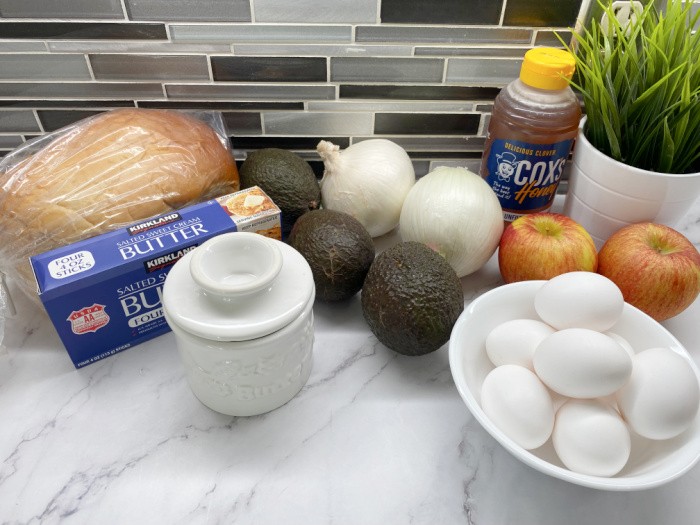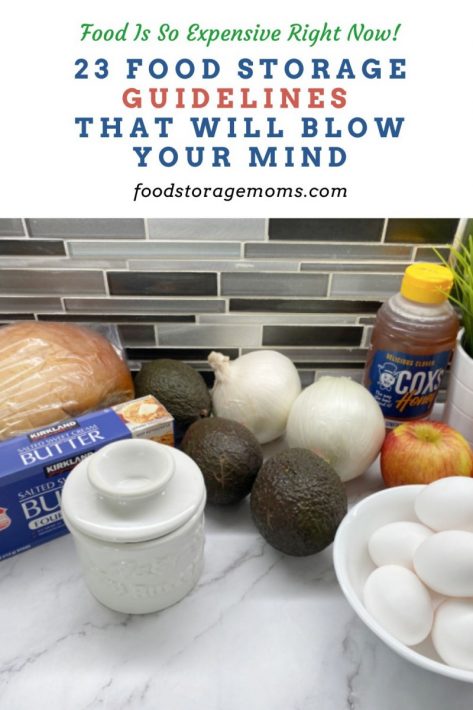
If you’re like me, you’re constantly looking for ways to improve your approach to food storage. It could mean the quantity of items stored, how they are organized, what containers to use, how often to rotate, and more. Well, look no further! I’ve compiled a list of 23 food storage guidelines that will blow your mind. Who knew that watermelon could be stored for so long? Check out these tips and tricks and start improving your food storage today!
I don’t know about you, but this drone thing going on in the US is a bit odd to me. (December 2024). They don’t sound like the typical drone you would buy at Walmart. The unknown wants me to stock up even more right now. Please stock food and water ASAP. Please be prepared for what is coming in the next few weeks. I’m talking about OTC medications as well.
My gut is telling me to suggest that you be ready to shelter in place. No, I do not have any information to back this thought, but let’s be honest. If you watch the news and read the online information daily, you must be prepared to shelter in place. Be ready to have power outages and water turned off. Yes, turned off in case of an emergency.
Huntsville, Utah’s Water is Shut Off. The city has a water leak somewhere, and no one can find it. The city is working diligently to locate it. The city is handing out bottled water; you can bring containers and fill them with the water they provide.

Food Storage Guidelines: The Basics
First and foremost, you want to ensure you are storing your food safely. If you are concerned about whether or not you are storing your food safely, be sure to check the FDA food storage guidelines. These food storage guidelines will help you steer clear of foodborne illnesses:
Refrigerate or Freeze Perishables ASAP
When you get home, you want to put away any foods that require refrigeration. If you can’t refrigerate them immediately, stick to the “2-hour rule.” So, never allow meat, poultry, seafood, eggs, or produce to sit at room temperature for longer than 2 hours.
Keep Your Refrigerator At The Right Temperature
Your refrigerator temperature should be at or below 40° F. Your freezer temperature should be 0° F. Appliance thermometers are the best way to check your temperatures periodically to ensure the appliance maintains the temps you want.
Sometimes, the seals around the doors will get compromised due to something getting between the seal and the door jam. Sometimes, the seals get brittle as they age and don’t indeed “seal.” Sometimes, the doors aren’t fully closed because the shelves are too full, which keeps the doors from closing tight.
I heard once that refrigerators and freezers are more efficient if the unit is kept full since the contents help hold the temperature where it should be.
Marinate Food In The Refrigerator
If you’re going to marinate food, always do it in the refrigerator – never on the counter. Marinating food at room temperature can cause bacteria to grow.
Freezer Burn Doesn’t Mean It’s Bad
If you see a freezer burn on your food, it doesn’t mean it has gone bad. Freezer burn is simply the result of air coming into contact with food. While it may not be as aesthetically pleasing, freezer-burned food is still safe. Cut off any freezer-burned portions before cooking or serving if you need to.
Keep Foods Covered
You want to ensure you’re keeping foods covered in the fridge and freezer. This will help prevent possible cross-contamination and freezer burn.
Always Check “Use By” Dates
Use-by dates are there for a reason. Be sure to check the use-by dates on your food, and try not to eat anything past its expiration date. I know there is a lot of controversy over “Best Buy Date” and “Best If Used By Date”. You can decide for yourself what works for you and your family. You may have found some foods that seem okay beyond those dates. I would certainly act on the side of caution. I have my own opinion. Let me leave it at that. Mark would eat ten-year-old Spam if it smelled good, so we are all different.
Food Storage Guidelines That Will Blow Your Mind
Now that you know the basics of food storage, check out these guidelines that will blow your mind!
Watermelon
Watermelon lasts longer at room temperature until it is cut. Then, you can wrap the cut watermelon in plastic wrap and store it in the refrigerator for about 2-weeks.
Keep Avocados at Room Temperature
Avocados will ripen faster if you store them at room temperature. Once they are ripe, you can store them in the fridge to help them last longer.
Ripen Fruit Faster by Putting It In A Paper Bag
You can ripen fruit faster by storing it in a closed paper bag. The ethylene gas released by the fruit will get trapped in the paper bag and speed up the ripening process.
Store Cheese In The Freezer
Cheese can be stored in the freezer for up to 2 months. Just be sure to wrap it tightly in plastic wrap or foil to prevent freezer burn. If you freeze chunks of cheese, be aware it may crumble when cutting it, or at least it has for me. I only freeze shredded Parmesan, Mozzarella, Mexican blend, cheddar, and Swiss cheeses. I do not freeze the blocks of cheese because they crumble after being frozen.
Bread
To keep bread fresh, store it in a cool, dry place. I use bread bags for my homemade bread. Please remember that homemade bread doesn’t have preservatives, so try making smaller loaves and freezing some loaves for later. Small One-Pound Bread Pans and Bread Bags with Ties.
Apples
Apples can last up to 6 months in the fridge. To help them last even longer, store them in the crisper drawer with a paper towel under them. This will help absorb any moisture that can cause the apples to spoil.
Real Maple Syrup
Real maple syrup can last up to 2-years if stored in the refrigerator. Real maple syrup has no preservatives and can become moldy after opening if it’s not chilled. If you can buy it in a glass jar, I’ve heard it’s better for storage.
Garlic
Garlic is best stored at room temperature. It can be stored on the counter for 3-4 months. Individual cloves will last 10 days on the counter. You can also freeze garlic for even longer. My favorite garlic tools: Garlic Press/Slicer and Roller
Keep Potatoes Away From Onions
Potatoes should be stored in a cool, dark place. But, they should not be stored near onions because they can tend to spoil each other faster.
Onions
Onions can last up to 2-months when stored in a cool, dry place. But, like potatoes, they should not be stored near other fruits and vegetables because they will spoil each other faster.
Tomatoes
Tomatoes should not be stored in the fridge. Storing them in the fridge can cause them to lose their flavor. Tomatoes are best stored at room temperature on the counter or in a pantry.
Eggs
You can store eggs in the fridge for up to 2-weeks. But you can also store them in the freezer for up to 1-year. Just be sure to crack them and mix them with water before freezing. How to Freeze Eggs: Everything You Need to Know
Butter Lasts Longer in the Fridge
Butter can last up to 2 months in the fridge. But, it will only last 1 month if stored at room temperature. And, if you have a hot or humid kitchen, your butter could spoil within a few days, so it’s best kept chilled. You can also use a Butter Bell.
Coconut Oil
Coconut oil can last up to 2-years without going bad. But it will last even longer if you store it in the fridge.
Bananas
Bananas are stored at room temperature on the counter or in a pantry until they become ripe. Once they are ripe with lots of spots, putting them in the refrigerator can help slow down the overripeness.
Honey
Honey can last indefinitely if it is stored properly. But it will start to crystallize, so please store your honey in smaller containers, preferably mason jars. You can set the jars outside in the sun to restore the honey to its original state.
Nuts
Nuts can last for months or even years if they are stored properly. The best way to store nuts is in an airtight container in the freezer. I use my FoodSaver in pint-size bags and then put them in the freezer.
Berries
Berries will last longer if you store them in the fridge. But they should be eaten within a few days for the best flavor.
Coffee
Coffee beans can last up to 2-years if stored in an airtight container in a cool, dark place. Ground coffee will only last a few weeks because it has been exposed to oxygen more.
Tea
Loose-leaf tea can last up to 3 years if stored in an airtight container in a cool, dark place. Tea bags will only last a few months because they are more exposed to oxygen.
Flour
Store flour in an airtight container in a cool, dark place to keep flour fresh. If you store it for over a few months, you can freeze it.
Sugar
Sugar can last indefinitely if stored in an airtight container in a cool, dark place. Be sure to keep it somewhere that doesn’t get a lot of heat and humidity. Keep your sugar dry.
Dried Herbs and Spices
Most dried herbs and spices will only last 6 months to 1 year. But, some can last 2-3 years if stored in an airtight container in a cool, dark place. I have to laugh over this one. I know some of my spices are 5-6 years old.
More Food Storage Information:
- 17 Shocking Things You Didn’t Know About Stocking Food
- How to Kick Start Your Food Storage Plan
- 7 Reasons Why Food Storage Is Common
- Why You Should Invest in Food Storage
Final Word
These are just a few of the many food storage guidelines that you should follow to keep your food from going bad. By following these food storage guidelines, you can be sure your food will stay fresh and delicious for as long as possible. What are your favorite tips for storing food? May God Bless this world, Linda
The post 23 Food Storage Guidelines That Will Blow Your Mind appeared first on Food Storage Moms.
from Food Storage Moms
No comments:
Post a Comment